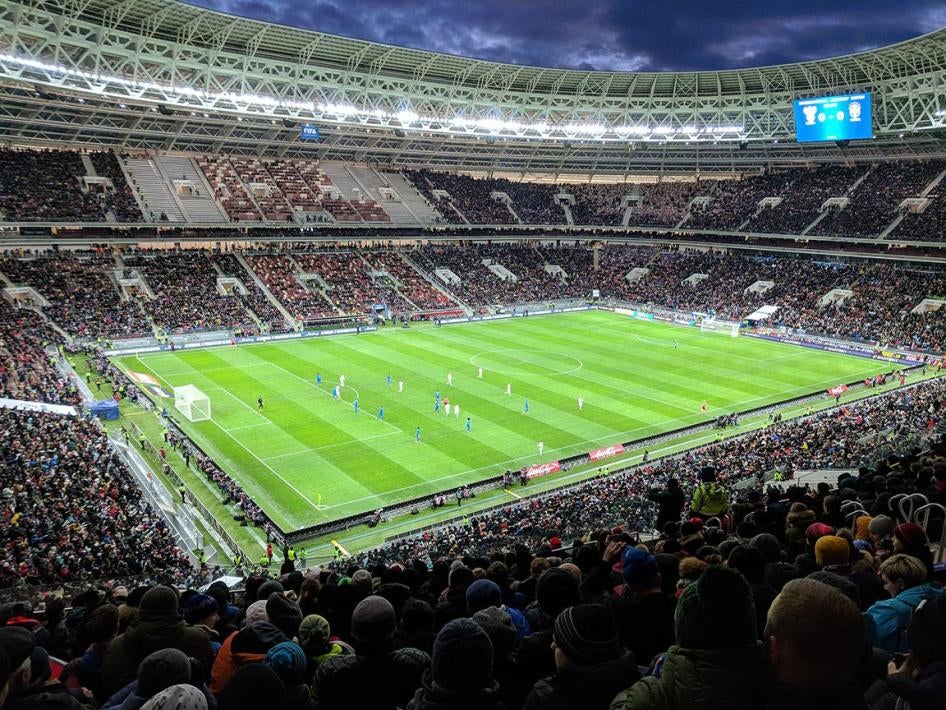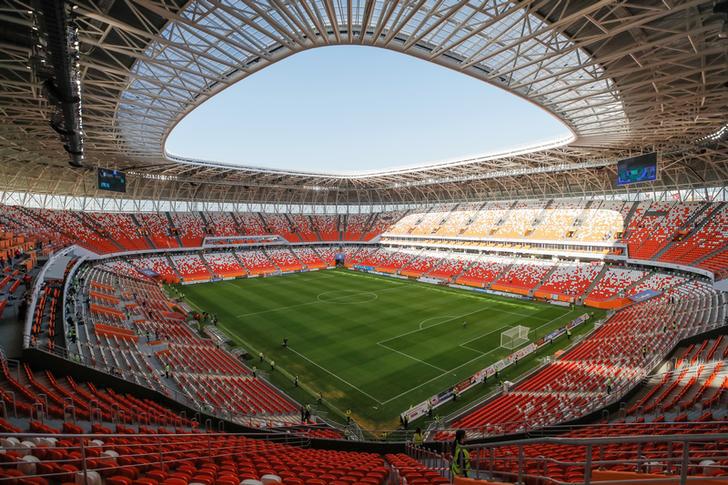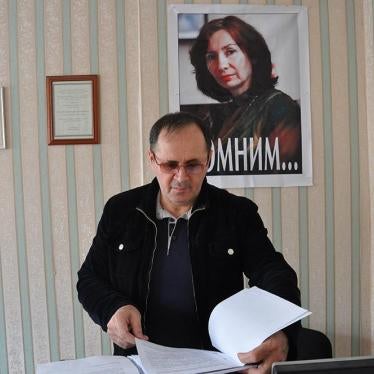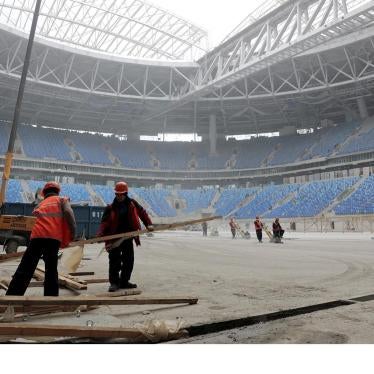(Berlin) – The FIFA World Cup starting on June 14, 2018, will take place during the worst human rights crisis in Russia since the Soviet era, Human Rights Watch said today. FIFA should use its leverage with the Russian authorities to address labor rights abuses, restrictions on fundamental freedoms, and an ongoing crackdown on human rights defenders.
The 44-page guide published today, “Russia: FIFA World Cup 2018 – Human Rights Guide for Reporters,” summarizes Human Rights Watch’s concerns associated with Russia’s preparations for and hosting of the 2018 FIFA World Cup and outlines broader human rights concerns in the country. It also describes FIFA’s new human rights policies and how they can be more effectively engaged to address the serious violations in Russia.
“Global sporting events such as the World Cup draw massive international media attention,” said Hugh Williamson, Europe and Central Asia director at Human Rights Watch. “We hope this guide helps reporters look beyond the football pitch to broader issues of concern in Russia.”
The backdrop to the tournament, which takes place over a month in 11 Russian cities, is a harsh and deteriorating environment for human rights, Human Rights Watch said. The authorities routinely use restrictive legislation to stifle freedoms of assembly, association, and expression. Government officials crackdown on dissent by enforcing repressive laws and increasing online censorship.
On May 11, German public broadcaster ARD announced its veteran sports reporter Hajo Seppelt was refused a visa to attend the World Cup in Russia. Seppelt and ARD have reported extensively on the sports doping scandal in Russia. Access for journalists to report is a central requirement of hosting the World Cup, Human Rights Watch said, and FIFA should act swiftly to guarantee media freedom.
“It is simply not acceptable to reject a journalist for doing his or her job, and FIFA needs to swiftly address and remedy the visa rejection by ensuring Hajo Seppelt can attend and report freely and without obstruction,” Williamson said.
On the international stage, Russia is providing weapons, military support, and diplomatic cover to the Syrian government, despite evidence that Syrian forces have committed war crimes and crimes against humanity.
In a June 2017 report, Human Rights Watch published its findings on labor abuses against workers on World Cup stadium construction sites, including wage delays, unsafe working conditions, and worker deaths. As of April 2018, the Building and Wood Workers’ International trade union recorded 21 worker fatalities on World Cup sites.
FIFA confirmed Grozny as the base camp where Egypt’s national team will train during the tournament. Grozny is the capital of the Chechen Republic, Russia’s most repressive region. Oyub Titiev, Chechnya director of leading Russian rights group Memorial, remains in custody there on bogus marijuana possession charges. The head of Chechnya, Ramzan Kadyrov, has repeatedly threatened and smeared human rights defenders, publicly referring to them as traitors and snitches. Titiev is one of the few remaining human rights defenders in the region and faces a 10-year prison sentence if convicted on these trumped-up charges.
In a February 2018 letter to FIFA President Gianni Infantino, Human Rights Watch urged FIFA to intervene directly with Russian President Vladimir Putin to call for Titiev’s release. Infantino and Putin met in Sochi on May 3, but it is not clear whether Infantino raised Titiev’s case.
In 2017 FIFA adopted a Human Rights Policy, pledging to “go beyond its responsibility to respect human rights” by taking “measures to promote the protection of human rights and positively contribute to their enjoyment.” The policy also states that “where the freedoms of human rights defenders … are at risk, FIFA will take adequate measures for their protection, including by using its leverage with the relevant authorities.”
“FIFA’s commitment on human rights defenders is welcome and essential,” Williamson said. “FIFA should show its commitment to human rights by urging the Kremlin to ensure Titiev is released before the World Cup kicks off next month.”
FIFA also added language on human rights protections to its statutes, staffed a human rights manager position, and established a Human Rights Advisory Board.
There are other steps FIFA can take to address and mitigate the human rights concerns raised by Human Rights Watch. FIFA should ask Russia to repeal its “gay propaganda” law, which violates FIFA’s requirements on nondiscrimination. FIFA should also urge Russia to end restrictions on demonstrations in World Cup cities before, during, and after the tournament.
“FIFA still has time to show that that it is ready to use its leverage with the Russian government to fulfill its own human rights policies,” Williamson said. “It’s in its interest to ensure the beautiful game isn’t marred by an ugly atmosphere of discrimination and repression.”








